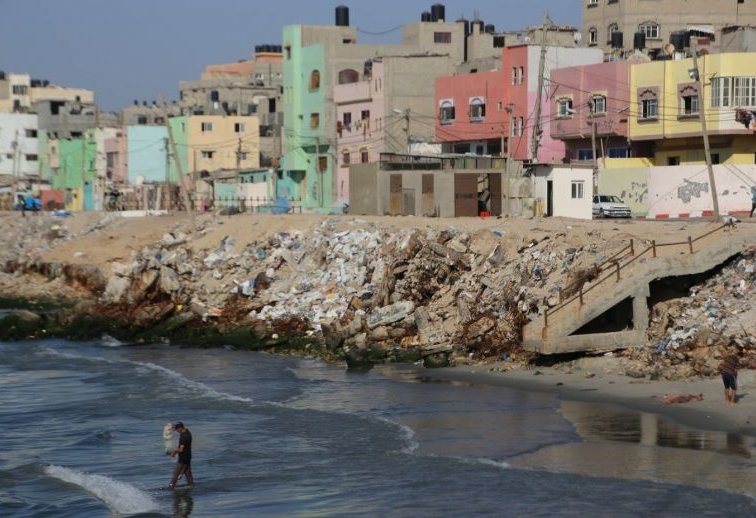Child dies from water pollution in Gaza amid worsening medical referral restrictions

Mohammed had been swimming in the sea in the Sheikh Ajlin area of Gaza city with his family on 19 July, and fell ill the following day with shigellosis, a bacterial infection caused by exposure to infected faeces. This infection caused toxic encephalopathy (brain disease), a rare complication of childhood shigellosis and with a high fatality rate. Mohammed fell into a coma and was transferred to intensive care. He died 10 days later at the Al Durra Children’s Hospital in Gaza city.
Mohammed’s is the first death publicly reported to have resulted from the worsening pollution of the sea around Gaza. Chronic electricity shortages since April have severely restricted the functioning of water and sewage treatment infrastructure in Gaza. 80% of Gaza’s shoreline is now believed to be polluted by untreated sewage, increasing the risk of widespread outbreaks of waterborne diseases.
Swimming is now banned in many areas, but with homes receiving as little as two hours of electricity per day at the height of summer, many people bypass these restrictions in order to cool off.
Mohammed’s case also highlights the growing restrictions on movement for Gaza patients needing treatment outside of Gaza. According to Al Mezan’s research, after Mohammed fell into a coma, his doctor recommended that he be referred for treatment outside of Gaza. His family applied repeatedly for financial coverage from the Ministry of Health in Ramallah for this, but it was never granted.
Mohammed’s father told Al Mezan:
“I went to the Department for Treatment Abroad in Gaza City to request financial coverage for my son’s hospitalization. I provided all of the required documents, including the diagnostic report and the doctors’ recommendation for referral. I was asked to wait for an hour for the decision to be made by the responsible staff at the Ministry of Health in Ramallah. However, no matter how many times I asked, I was constantly told that no decision had been made or communicated. For a whole week, I kept trying to secure the referral to cover Mohammed’s medical treatment outside Gaza, and I sought the help of different figures to speed up the decision at the Ministry of Health in Ramallah to approve our request. Nevertheless, no approval was granted.”
Patient access to care outside of Gaza has been increasingly restricted this year. According to the latest data from the World Health Organisation, June had the lowest number of referral decisions granted by the Ministry of Health in Ramallah for Gaza patients since 2009 (when recording of this data began), 80% lower than the monthly average for 2016.
At the same time, patients continued to struggle for permits to exit for treatment via the Erez crossing, with the Israeli authorities granting only half of all applications in June. So far this year, at least 25 people are reported to have died after their exit from Gaza for medical care elsewhere was blocked.
Unless urgent action is taken to resolve Gaza’s worsening electricity crisis, Mohammed’s tragic death may be the first of many to result from water-borne disease. Without a lifting of the ever-increasing restrictions on patient movement and referral out of Gaza, more preventable deaths from various diseases are also likely to occur.
Israel has an international legal obligation, as the occupying power, to ensure humanitarian assistance to the population under its control, including access to medical care. Notwithstanding the constraints of the occupation, all Palestinian duty-bearers, including the Palestinian Authority and the de facto authorities in Gaza, are also obliged to respect, protect and fulfil the rights of Palestinians and ensure access to medical care without discrimination.
The UK Government must do its part to support patients in Gaza during this immediate crisis, both by supporting immediate humanitarian relief, and by renewing diplomatic efforts to end the unlawful closure which has collectively punished the entire population of Gaza for more than a decade.
Click hereto see how you can help call on the UK to take action.
Related content


